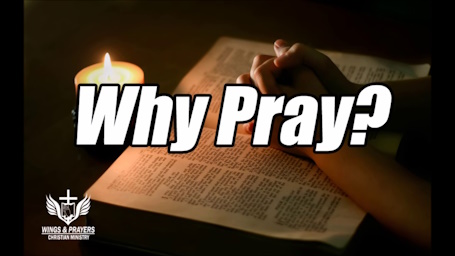SundayReflection
11th June 2023
Brittany Rust asks

Why Do We Pray
if God Ultimately Decides the Outcome?
I had never prayed before the moment I prayed for salvation.
I was sixteen years old and heard the Gospel for the first time,
knowing immediately I wanted Jesus.
And so, I prayed, offering words to a Saviour I barely knew but
wanted to follow desperately.
Realising quickly that prayer was an important aspect
of the believer's life, I wanted to know more.
Our youth group held a time before Wednesday night service when
teenagers could come an hour early and pray.
I came to Jesus with a lot of hurt and bondage -
anger issues, sexual sin, and stronghold -
and I desperately needed freedom.
So, when I heard that the battle is won in prayer, I battled hard.
And God heard my prayers!
God answered many prayers and did the seemingly impossible right
before my eyes!
But then I started feeling as if my prayers fell on deaf ears.
Prayers were no longer being answered in the way I wanted them to,
as often as I'd like them to.
I wrestled with God and wondered what was happening.
Why were my prayers no longer being answered?
Since then, I've learned so much about prayer.
And I've been asked many questions about prayer.
One of the most common: if God ultimately decides the outcome,
why should I pray?
When we ask if our prayers change God's mind, we wonder if there is
room for God to change based on our actions.
However, can our prayers change the circumstances?
Yes, they can.
Knowing beforehand how our actions and prayers would lend to
a shift in the outcome, God planned it accordingly.
In His perfect timing and place, God answers our prayers for His glory!
So, why do we pray?
If God has already determined what He will do, what's the point?
"Rejoice always, pray without ceasing,
give thanks in all circumstances; for this is the will of God
in Christ Jesus for you." 1 Thessalonians 5:16-18 (ESV)
Paul writes that it is God's will we should pray without ceasing.
He means we should have a heart, lifestyle, and attitude to pray.
That our first inclination should be to talk to Him.
When we run into any obstacle, may we always turn to God first rather
than a friend or spouse.
God is our first line of communication, always.
What this reflects, more than anything, is a heart posture
surrendered to God.
Prayer puts us in direct communication with our incredible God,
brings down idols and distractions, paves the way for deliverance,
and tunes our ear into His voice.
We are called to pray because so much hinges on our
communication with Him.
All throughout the Bible, we see people pray and things change.
Hannah prayed fervently for a child and God 'opened her womb'.
Elijah prayed for drought, and then rain, and God moved both times.
Peter prayed to be released from prison, and his prayer was answered.
You and I can have full confidence that God hears our prayers.
And that at the right time, in the right way, He will respond.
It won't always be the way we hoped,
but it will always be the way He desires.
I've come to find that the most valuable aspect of prayer completely
defies what we've believed about prayer for so long.
Prayer is more about changing us than changing God.
So often we go to prayer for a need and ask God to move.
But what if that isn't His will?
That's when we become discouraged because we want to believe that
God hears our prayers, and yet He may not choose to move in such a way.
He may withhold meeting that need or choose to go another route.
When He does, we must remind ourselves that in prayer,
He may be more concerned with aligning us to His will rather
than the other way around.
Brittany Rust Contributing Writer Crosswalk.com
Brittany Rust has a passion to see people impacted by the power of
God's Word and His abundant grace, through writing and speaking.
She is the founder of Truth and Grace Ministries, Truth x Grace Women,
and is the author of five books.
Brittany lives with her husband, Ryan, and son, Roman, in Castle Rock, Colorado.
Learn more at www.brittanyrust.com